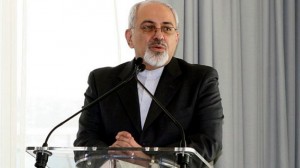
Iranian Foreign Minister Mohammad Javad Zarif warned threats and sanctions are no solution to his country's nuclear program.
Iran�s�Foreign Minister Mohammad Javad Zarif�today warned�that the international community risked�missing a chance to strike a deal over Iran�s nuclear program and lambasted a �zero-sum� diplomatic approach in which each side tried to make gains at the expense of the other.
�The result is, 10 years ago Iran had less than 160 centrifuges spinning, now we have over 18,000. Ten years ago Iran�s economy was prospering; now we have sanctions hurting the Iranian people,� said Zarif, speaking at a disarmament conference in Istanbul known as Pugwash. �So I hope we have come to understand that the approach was wrong.�
High-profile negotiations have failed to impose limits on Iran�s nuclear program in exchange for lifting sanctions ��the core of any deal ��despite 1.5 years of talks between Iran and the P5+1 group (the US, Russia, China, Britain, France and Germany). Hope of progress has been rekindled by the election of centrist President Hassan Rouhani, and his stated desire to resolve the nuclear issue in less than a year.
Zarif said today that Iran was ready to �do everything in our negotiations with the P5+1 to ensure that even the perception that Iran has anything but peaceful intentions for its nuclear program will be removed, because we believe that even the perception that Iran pursues a nuclear weapons program is not only wrong, but dangerous.�
In a sign of the sensitivity of the talks, Obama administration officials are campaigning to�prevent the US Congress�from imposing more sanctions�now, just days before P5+1 talks with Iran resume in Geneva.�Vice President Joe Biden, joined by Secretary of State John Kerry, and Treasury Secretary Jack Lew lobbied lawmakers behind closed doors�Thursday�in an effort to delay new measures.
"There is no doubt that our efforts to apply economic pressure on Iran through sanctions have�gotten us where�we are today � to have the opportunity to test Iranian intentions to seek an enduring diplomatic solution," said�Bernadette Meehan, the National Security Council spokesperson in Washington.
�No one is suggesting an open-ended delay for new sanctions, and there may come a point where additional sanctions are necessary,� says Ms. Meehan. �At the same time, we believe it is important for Congress to reserve its ability to legislate for the moment when it�s most effective in order to give the current P5+1 negotiations the best chance."
Israel and some in Congress demand that Iran dismantle its entire nuclear program ��a result that few believe is possible, considering the current scale of Iran�s facilities and extent of its expertise.
Iranian officials have chafed at the dual-track US policy of simultaneously applying pressure while negotiating, calling it �illogical� and dismissing the �stick� of sanctions as suitable only for donkeys. Tehran has also made clear that more sanctions now would harm chances of any nuclear deal, deepening the mistrust that has plagued US-Iran relations for a generation.
The Obama administration is considering an�initial�agreement that would freeze or even roll back parts of Iran�s nuclear program, effectively slowing Iran's nuclear progress for the first time in years,�while negotiations continue toward a final deal.
The administration is considering modest sanctions relief that would be time-limited and reversible. The�oil and financial sanctions, which have done most harm to Iran�s economy, would be�largely left intact, in a bid to maintain leverage during the talks.�It is not clear�if this would be enough incentive for Tehran,�where Mr. Rouhani has vowed to resolve the nuclear issue and improve the economy in months, not years.
The P5+1 proposal presented to Iran last spring in Almaty, Kazakhstan, offered only modest sanctions relief to Iran ��on petrochemical and precious metal deals � but required Iran to take several steps that Iran saw as giving up their most important cards.
Iran rejected that offer, which would have required a halt of enrichment to 20 percent purity ��a level a few technical steps from bomb grade � and rendered Iran�s deeply buried Fordow facility inoperable, but did not begin easing the most punishing sanctions.
Iran has signaled repeatedly that it is willing to cap enrichment below 5 percent purity, which is necessary for nuclear�fuel,�and accept limits on centrifuge numbers and a more intrusive UN inspection regime ��if the price is right.
Zarif brought up a 2005 Iranian proposal to limit Iran�s nuclear program to a stage far below current capacity, which was offered before nuclear-related sanctions were imposed.�The US�rejected it because, at the time, it had a zero-enrichment policy for Iran (that position has not officially changed). Years later, many experts see that 2005 offer,�among�others�as a missed opportunity.
�Whether we succeed or not will depend on whether they want to agree to something that is doable now, or wish for it two years after,� said Zarif. �I hope they�ve learned their lesson [of past missed opportunities], that something that is on the table now is in their interest.�
The P5+1 and Iran resume talks next week in Geneva.
By The Christian Science Monitor
The Iran Project is not responsible for the content of quoted articles.










